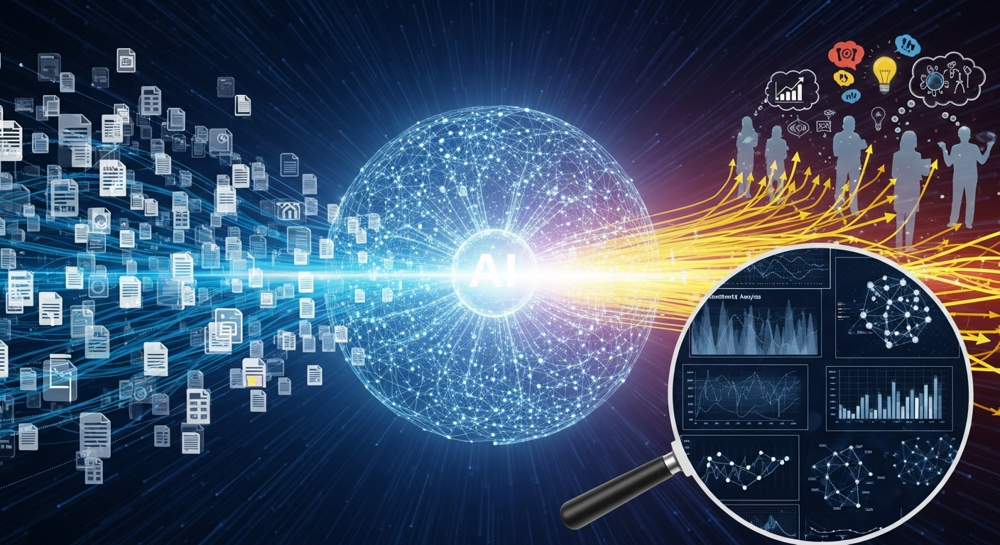Unlock Document Intelligence: Powering Decision-Making with AI-driven RAG

Unlock Document Intelligence: Powering Decision-Making with AI-driven RAG
In today's data-rich environment, organizations are constantly seeking ways to extract maximum value from their vast archives of documents. From legal contracts and financial reports to customer feedback and internal memos, the sheer volume of unstructured information can be overwhelming. The challenge isn't just storing this data, but transforming it into actionable intelligence that drives informed decision-making. This is where Retrieval-Augmented Generation (RAG) steps in, offering a revolutionary approach to document understanding and knowledge retrieval.
The Business Problem: Drowning in Documents, Thirsty for Insights
Imagine a business analyst needing to synthesize market trends from dozens of quarterly reports, a legal team sifting through thousands of contracts for specific clauses, or a research department trying to connect disparate pieces of information across various scientific papers. Traditional methods—manual reading, keyword searches, or even basic data extraction tools—often fall short. They are:
- Time-Consuming: Manually reviewing large datasets is a drain on resources.
- Prone to Error: Human oversight can lead to missed details or misinterpretations.
- Limited in Scope: Keyword searches can retrieve documents, but struggle to answer complex, nuanced questions that require synthesizing information from multiple sources.
- Lacking Context: Without deeper understanding, the 'why' behind the data remains elusive.
The core problem is the gap between raw, unstructured document data and the need for immediate, contextualized insights. This bottleneck hinders agility, slows down strategic planning, and can lead to suboptimal decisions.
Introducing AI-Driven RAG for Document Intelligence
Onboarding Buddy's File Management API, with its advanced RAG capabilities, is designed to bridge this gap. Retrieval-Augmented Generation combines the power of large language models (LLMs) with a robust information retrieval system. Instead of relying solely on the LLM's pre-trained knowledge (which can sometimes 'hallucinate' or provide outdated information), RAG first retrieves relevant snippets from your specific, authoritative documents. These retrieved passages then act as a factual basis, guiding the LLM to generate accurate, contextualized, and up-to-date answers to your queries.
This approach significantly enhances the reliability and trustworthiness of AI-generated responses, transforming your document repository into an intelligent knowledge base.
How Onboarding Buddy's Document RAG API Works
At the heart of this capability is the /file-service/query/rag endpoint. After you've uploaded your documents using the API (e.g., PDFs, text files), Onboarding Buddy processes them, creating an intelligent index. When you submit a query, the RAG system performs a semantic search across your indexed documents, identifies the most relevant sections, and then uses a powerful language model to generate a precise answer based *only* on the retrieved content.
Code Example: Querying Your Documents with Python
Here's how you can use the Onboarding Buddy API to perform a document RAG query in Python:
import requests
import uuid
headers = {
"ob-app-key": "<your-app-key>",
"ob-api-key": "<your-api-key>",
"ob-api-secret": "<your-api-secret>",
"Content-Type": "application/json"
}
payload = {
"correlationId": str(uuid.uuid4()),
"fileGlobalId": "<your-file-global-id>", # The ID of your uploaded document
"searchString": "What are the key financial highlights from the Q3 report?"
}
response = requests.post(
"https://api.onboardingbuddy.co/file-service/query/rag",
headers=headers,
json=payload)
response.raise_for_status()
print(response.json())
This simple call sends your question to the API, specifying the document (or documents, if querying across multiple) you want to interrogate. The API then returns a synthesized answer, grounded in the content of your documents.
Benefits Across Industries
- Business Analysts & Researchers: Quickly synthesize information from extensive datasets, market research, or scientific literature to identify trends, opportunities, and risks.
- Legal Professionals: Rapidly find relevant clauses, precedents, or contractual obligations within vast legal documents, significantly reducing review time.
- Financial Services: Extract specific financial data, assess regulatory compliance, or analyze risk factors from reports and disclosures.
- Customer Support: Power intelligent chatbots that provide accurate answers drawn directly from product manuals and FAQs.
- Product Managers: Understand user feedback and market demands by querying customer reviews and competitor analysis.
By transforming raw documents into an interactive knowledge base, RAG empowers professionals to ask complex questions and receive concise, evidence-based answers, drastically improving efficiency and decision quality.
The Future of Document Intelligence
The field of RAG and AI-powered document intelligence is evolving rapidly. Future trends include:
- Multi-modal RAG: Expanding beyond text to include images, videos, and audio in the retrieval process, offering a more holistic understanding of information.
- Personalized Knowledge Assistants: AI systems that learn individual user preferences and work patterns to proactively deliver relevant insights.
- Real-time Information Integration: RAG systems will increasingly integrate with live data feeds, ensuring that responses are not only accurate but also up-to-the-minute.
- Self-improving RAG: Models that continuously learn from user interactions and feedback to refine their retrieval and generation capabilities.
These advancements promise to make document intelligence even more powerful and ubiquitous, embedding AI deeply into how businesses operate and make decisions.
Ready to Transform Your Documents into Intelligence?
Unlock the full potential of your unstructured data. Discover how Onboarding Buddy's Document RAG API can revolutionize your research and business analysis. Visit onboardingbuddy.co to learn more.
 Onboarding Buddy BETA
Onboarding Buddy BETA